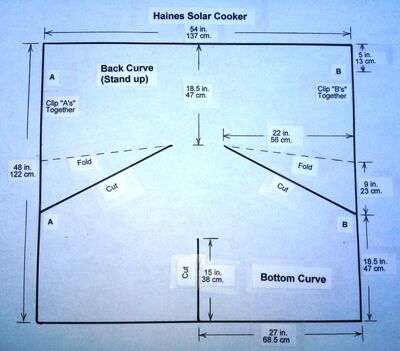Paul Hedrick (talk | contribs) mNo edit summary |
RogerHaines (talk | contribs) No edit summary |
||
| Line 3: | Line 3: | ||
[[File:Haines_Windscreen.jpg|thumb|300px|The cooker is shown with an added clear nylon cover to help in windy conditions.]] |
[[File:Haines_Windscreen.jpg|thumb|300px|The cooker is shown with an added clear nylon cover to help in windy conditions.]] |
||
[[File:Haines_Polycarbonate_Sleeve.jpg|thumb|300px|The '''Haines Polycarbonate Sleeve '''eliminates the nylon cooking bag commonly used in solar cooking.]] |
[[File:Haines_Polycarbonate_Sleeve.jpg|thumb|300px|The '''Haines Polycarbonate Sleeve '''eliminates the nylon cooking bag commonly used in solar cooking.]] |
||
| − | The [[Haines Solar Cooker]] combines the power of a [[Funnel cooker]] with stability of the traditional [[CooKit]]. It has been designed by Roger Haines of San Diego, {{state|California}}, [[USA]]. The cooker is made from a mylar-coated bubble insulation material |
+ | The [[Haines Solar Cooker]] combines the power of a [[Funnel cooker]] with stability of the traditional [[CooKit]]. It has been designed by Roger Haines of San Diego, {{state|California}}, [[USA]]. The cooker is made in the USA from a mylar-coated bubble insulation material that is sold "off-the shelf" at Lowe's Home Centers in 4-foot by 25-foot rolls. The material can also be ordered on-line under different brand names. The material is strong (Roger has driven his car over it without breaking the bubbles) and it is.unaffected by boiling water. The cooker is made from a single 48" by 54" rectangle of bubble material, and requires only three cuts with ordinary scissors for cooker assembly. In testing in November, 2012 in San Diego, this cooker heated an empty pot to a sustained 380 degrees Fahrenheit (193 degrees Cesius) and heated a liter of water from room temperature to boiling in less that an hour. |
| − | The base of the cooker should be anchored with rocks or bricks. |
+ | The base of the cooker should be anchored with rocks or bricks as shown in the photo. The two curves of the cooker form an oval funnel that can be made quite stable in the wind by the addition of an oval wind screen made of clear plastic. The windscreen also makes this panel cooker into a "quasi-box" cooker. When the sun is high, the cut at the front bottom of the cooker can be overlapped and clipped together with a binder clip to concentrate more sun on the cooking pot. |
| − | The '''Haines Polycarbonate Sleeve '''eliminates the nylon cooking bag commonly used in solar cooking. This sleeve is a cylinder of polycarbonate plastic film (about the |
+ | The '''Haines Polycarbonate Sleeve '''eliminates the nylon cooking bag commonly used in solar cooking. This sleeve is a cylinder of stiff polycarbonate or other high-temperature plastic film (about the stiffness of card stock paper), which encloses the bottom and sides of the pot but not the top. The cylinder can be held together with paper clips, which allows its diameter to be adjusted to fit a variety of cooking pots The pots must be round, with no handles, and must have a top rim that can rest on the top of the cylinder. The cylinder elevates the pot above the surface of the cooker, allowing the sun's rays to bounce off the reflective surface of the cooker and be absorbed by the bottom of the cooking pot. It also provides an insulating "greenhouse" making a traditional cooking bag unnecessary. Haines's testing indicates that a pot with a glass lid retains more heat than one with a metal lid. |
[[File:Template_for_Haines_Cooker.jpg|thumb|400px|Template for Haines Cooker]] |
[[File:Template_for_Haines_Cooker.jpg|thumb|400px|Template for Haines Cooker]] |
||
[[File:Drawing_of_Haines_Cooker.jpg|thumb|400px|Assembly diagram for the Haines Cooker]] |
[[File:Drawing_of_Haines_Cooker.jpg|thumb|400px|Assembly diagram for the Haines Cooker]] |
||
Revision as of 22:42, 3 December 2012

The cooker is shown with an added clear nylon cover to help in windy conditions.

The Haines Polycarbonate Sleeve eliminates the nylon cooking bag commonly used in solar cooking.
The Haines Solar Cooker combines the power of a Funnel cooker with stability of the traditional CooKit. It has been designed by Roger Haines of San Diego, California, USA. The cooker is made in the USA from a mylar-coated bubble insulation material that is sold "off-the shelf" at Lowe's Home Centers in 4-foot by 25-foot rolls. The material can also be ordered on-line under different brand names. The material is strong (Roger has driven his car over it without breaking the bubbles) and it is.unaffected by boiling water. The cooker is made from a single 48" by 54" rectangle of bubble material, and requires only three cuts with ordinary scissors for cooker assembly. In testing in November, 2012 in San Diego, this cooker heated an empty pot to a sustained 380 degrees Fahrenheit (193 degrees Cesius) and heated a liter of water from room temperature to boiling in less that an hour.
The base of the cooker should be anchored with rocks or bricks as shown in the photo. The two curves of the cooker form an oval funnel that can be made quite stable in the wind by the addition of an oval wind screen made of clear plastic. The windscreen also makes this panel cooker into a "quasi-box" cooker. When the sun is high, the cut at the front bottom of the cooker can be overlapped and clipped together with a binder clip to concentrate more sun on the cooking pot.
The Haines Polycarbonate Sleeve eliminates the nylon cooking bag commonly used in solar cooking. This sleeve is a cylinder of stiff polycarbonate or other high-temperature plastic film (about the stiffness of card stock paper), which encloses the bottom and sides of the pot but not the top. The cylinder can be held together with paper clips, which allows its diameter to be adjusted to fit a variety of cooking pots The pots must be round, with no handles, and must have a top rim that can rest on the top of the cylinder. The cylinder elevates the pot above the surface of the cooker, allowing the sun's rays to bounce off the reflective surface of the cooker and be absorbed by the bottom of the cooking pot. It also provides an insulating "greenhouse" making a traditional cooking bag unnecessary. Haines's testing indicates that a pot with a glass lid retains more heat than one with a metal lid.

Template for Haines Cooker

Assembly diagram for the Haines Cooker
See also
Contact

Roger Haines
Roger Haines
Tel.: +1 (858) 736-5505
Email: bhaines@san.rr.com

